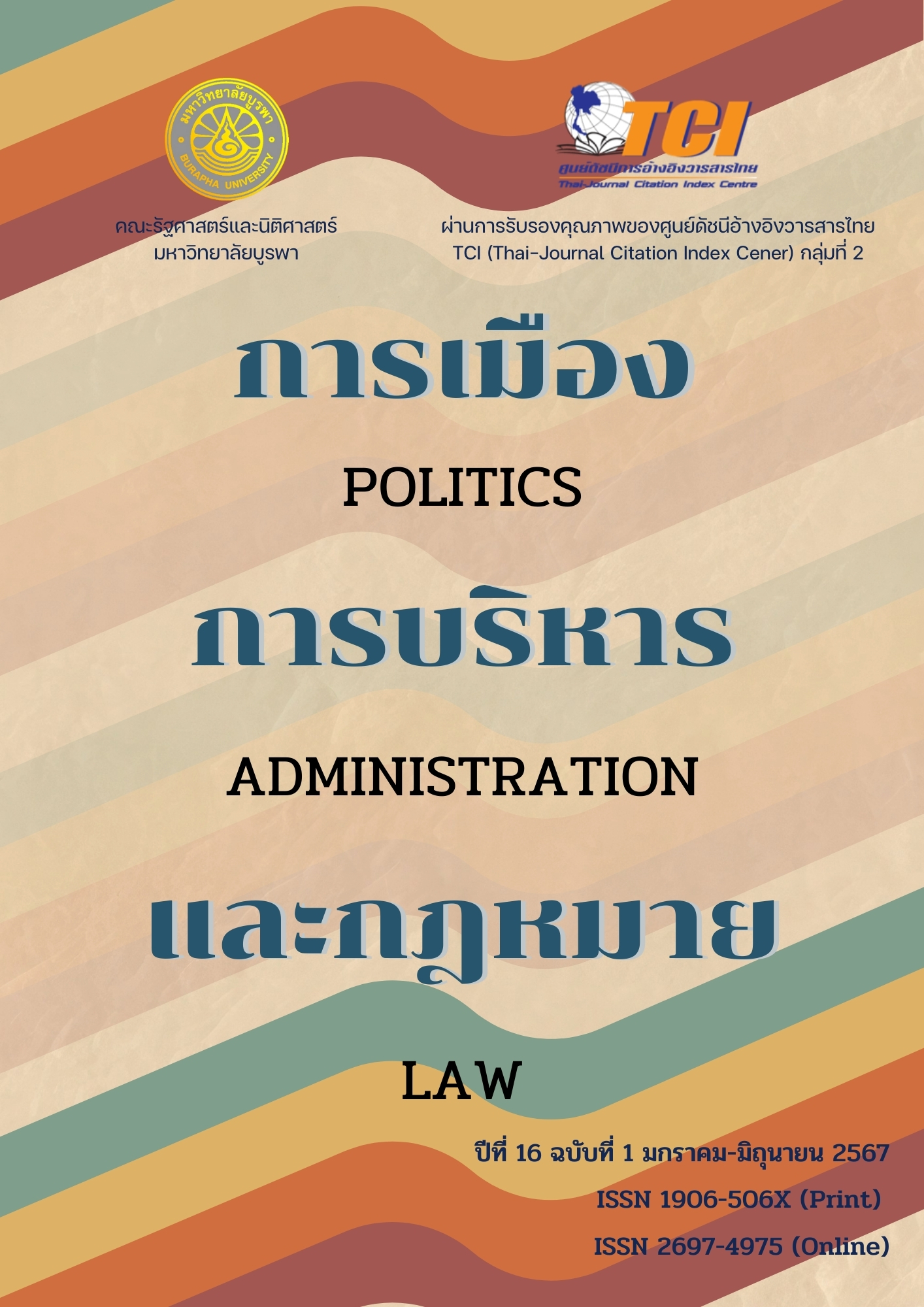Strategic Policy Making of Political Parties in the Digital Era
Keywords:
Strategy, Policy Making, Political Parties, Digital EraAbstract
The purpose of this research was to study recommendations for policy-making strategies of political parties in the digital era. It is qualitative research. This research used a qualitative research consisting of studying information from secondary documents and in-depth interviews. There were 19 key informants including politicians, academics, businessmen, and citizens. The research tools were semi-structured interviews created by the researcher. Data obtained from in-depth interviews and secondary data will be analyzed using content analysis with contextual unit.
The results of the analysis by using the SWOT Matrix technique found that from a total of 4 different alternatives, namely proactive (SO Strategy), preventive (ST Strategy), corrective (WO Strategy) and defensive (WT Strategy) can be analyzed different options in 11 strategic issues and grouped together into 3 strategies for policy-making of political parties in the digital age as follows; Strategy1: Develop policies with big data and modern digital system, Strategy2: Upgrade the policy network into a think tank, Strategy3: Develop communication channels for policy formulation. Suggestions for the strategy to be successful include: 1) Political parties should develop and link databases with cooperation partners from various parties. 2) Political parties should adjust their work processes in new ways by giving importance to developing the abilities of party personnel to have the capacity to develop policies and develop organizations towards excellence. 3) Political parties should develop a prototype think tank for political party policy. 4) Political parties promote the opening of public forums to stakeholders to express their opinions.
References
เกรียงศักดิ์ เจริญวงศ์ศักดิ์. (2558). คลังสมอง (Think-Tank) กับการพัฒนาประเทศไทย. วันที่ค้นข้อมูล 22 มกราคม 2567, เข้าถึงได้จาก https://www.bangkokbiznews.com/blog/detail/634063
นันธิดา จันทร์ศิริ. (2558). การจัดการเครือข่ายในกระบวนการนโยบายสาธารณะ. สารอาศรมวัฒนธรรมวลัยลักษณ์, 15(1), 145-153.
พระราชบัญญัติประกอบรัฐธรรมนูญว่าด้วยพรรคการเมือง พ.ศ. 2560. (2560, 7 ตุลาคม). ราชกิจจานุเบกษา. เล่มที่ 134 ตอนที่ 105 ก.
วุฒิพร ลิ้มวราภัส และสุวิชา เป้าอารีย์. (2563). กระบวนการมีส่วนร่วมทางการเมืองผ่านสื่อออนไลน์: กรณีศึกษา โพสต์ทูเดย์ และแนวหน้า. วารสารรังสิตบัณฑิตศึกษาในกลุ่มธุรกิจและสังคมศาสตร์, 6(2), 106-118.
แสวง บุญมี. (2560). บทบาทของคณะกรรมการการเลือกตั้งกับการพัฒนาระบบพรรคการเมืองไทยเพื่อการปฏิรูปประเทศตามรัฐธรรมนูญ แห่งราชอาณาจักรไทย พุทธศักราช 2560. กรุงเทพฯ: วิทยาลัยป้องกันราชอาณาจักร.
สำนักงานคณะกรรมการการเลือกตั้ง. (2562). ประกาศผลการเลือกตั้งสมาชิกสภาผู้แทนราษฎรแบบบัญชีรายชื่อ. วันที่ค้นข้อมูล 25 พฤศจิกายน 2566, เข้าถึงได้จาก https://www.ect.go.th/ect_th/download/ article/article_20190508184334.pdf
สำนักงานคณะกรรมการพัฒนาระบบราชการ. (2565). คู่มือการประเมินสถานะของหน่วยงานภาครัฐในการเป็นระบบราชการ 4.0. กรุงเทพฯ: สำนักงานคณะกรรมการพัฒนาระบบราชการ.
สํานักงานเลขาธิการสภาผู้แทนราษฎร. (2561). บทบาทหน้าที่ของสาขาพรรคการเมืองตามพระราชบัญญัติประกอบรัฐธรรมนูญว่าด้วยพรรคการเมือง พ.ศ. 2560. กรุงเทพฯ: สำนักวิชาการสํานักงานเลขาธิการสภาผู้แทนราษฎร.
สำนักงานเลขาธิการสภาผู้แทนราษฎร. (2563). แผนปฏิบัติราชการสำนักงานเลขาธิการสภาผู้แทนราษฎร พ.ศ. 2563 - 2565 (ฉบับปรับปรุง พ.ศ. 2564). กรุงเทพฯ: สำนักนโยบายและแผนสำนักงานเลขาธิการสภาผู้แทนราษฎร.
สุวิทย์ สาสนพิจิตร์. (2561). โมเดลความสัมพันธ์เชิงสาเหตุความนิยมพรรคการเมืองผ่านสื่อสังคมออนไลน์ ของนักศึกษาสถาบันอุดมศึกษาในกํากับของรัฐในเขตกรุงเทพมหานครและปริมณฑล. วิทยานิพนธ์สารสนเทศศาสตรมหาบัณฑิต, สาขาวิชาเทคโนโลยีสื่อสังคม, วิทยาลัยนวัตกรรมดิจิทัลและเทคโนโลยีสารสนเทศ, บัณฑิตวิทยาลัย, มหาวิทยาลัยรังสิต.
Aguilar, F, J. (1967). Scanning the Business Environment. New York: Macmillan.
Anderson, E. (1994). Public Policy Making: Introduction (2 nd ed.). New York: Houghton Mifflin Company.
Denhardt, R. B., & Denhardt, J. V. (2007). The New Public Service: Serving, Not Steering. New York: M.E. Sharpe.
Kotler, P., & Armstrong, G. (2018). Principles of marketing (17th ed.). Harlow, England: Pearson.
Yin, R, K. (2003). Case Study Design and Research: Design and Methods (3 rd ed.). Thousand Oaks, CA: Sage Publications.
Downloads
Published
Issue
Section
License

This work is licensed under a Creative Commons Attribution-NonCommercial-NoDerivatives 4.0 International License.






